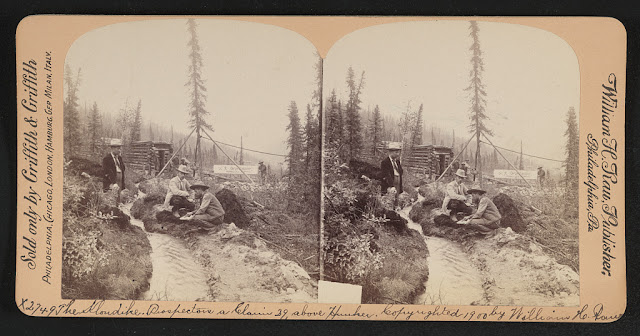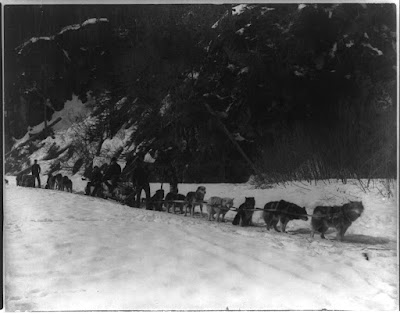El ritmo de los párrafos en 'Colmillo Blanco' (IV)
PROCESOS RELACIONALES Y EXISTENCIALES
 |
| Tramp life - how Jack London travelled on a passenger coach (1907) Library of Congress Prints and Photographs Division Washington, D.C. 20540 USA |
Los procesos relacionales son aquellos en los que algo o alguien “es”, “tiene” o “está en” una circunstancia. Existen tres tipos de procesos relacionales: intensivos (ser), posesivos (tener) y circunstanciales (estar en).
Los
procesos relacionales presentan un esquema que identifica a un PORTADOR, el
PROCESO mismo que se realiza y un ATRIBUTO. Por ejemplo, tenemos los siguientes
procesos intensivos que califican a
lo Salvaje (la naturaleza, la tierra, el viento, los árboles, etc.):
|
PORTADOR |
PROCESO |
ATRIBUTO |
|
The land itself |
was |
a desolation (pág. 91) |
|
Life |
is |
movement (pág. 92) |
|
The day |
was |
a repetition of the
days that had gone before (pág. 101) |
Por
supuesto, en la novela también se califican otros elementos. Lo importante de
estas relaciones es que vienen expresadas a través de las palabras del narrador. El entorno, el estado de los personajes o
las relaciones entre estos y lo que les rodea son descritas mediante la voz de
una tercera persona que no se
encuentra incluida en la historia. Este narrador tiene la capacidad de conocer
el estado de las cosas en todo momento y en cualquier punto de la historia, por
lo que se trata de un narrador en
tercera persona y omnisciente. Algunos
ejemplos rápidos son:
Dark spruce forest frowned on either side the
frozen waterway. The trees had been stripped by a recent wind of their white
covering of frost, and they seemed to lean toward each other, black and
ominous, in the fading light. A vast silence reigned over the land. The land
itself was a desolation, lifeless, without movement, so lone and cold that the
spirit of it was not even that of sadness.
(pág. 91)
In advance of the dogs, on wide snowshoes, toiled a man. At the rear of the sled toiled a second man. On the sled, in the box, lay a third man whose toil was over, —a man whom the Wild had conquered and beaten down until he would never move nor struggle again. It is not the way of the Wild to like movement. Life is an offense to it, for life is movement; and the Wild aims always to destroy movement (pág. 92)
La identificación del narrador es fundamental para reconocer, más tarde, a qué tipología narrativa pertenece la novela y abordar su traducción de una manera estructurada.
En
cuanto a los procesos existenciales,
expresan que algo existe u ocurre. Por razones obvias son más comunes en textos
literarios y, en inglés, están compuestos por la palabra THERE, que no
participa en la cláusula ni es una circunstancia en ella (únicamente indica la
cualidad de existir), el PROCESO que se desarrolla, que es el verbo to be, y el EXISTENTE, que es aquello de
lo que se dice que existe.
El
esquema entonces quedaría:
|
THERE |
PROCESO |
EXISTENTE |
|
There |
was |
a hint in it of
laughter (pág. 91) |
|
(But) there |
was |
life, abroad in the
land and defiant (pág. 92) |
En la
descripción de procesos existenciales también es posible distinguir que el tipo
de narrador que presenta la novela es en tercera persona y omnisciente. Aquí
unos ejemplos:
There was a hint in it of laughter, but of a
laughter more terrible than any sadness—a laughter that was mirthless as the
smile of the Sphinx (…) (pág. 91)
But there was life, abroad in the land and defiant.
Down the frozen waterway toiled a string of wolfish dogs. Their bristly
fur was rimed with frost (pág. 92)
CONCLUSIÓN
El análisis
de los procesos relacionales y existenciales nos facilita la identificación del
narrador en la novela, lo que nos da un narrador
en tercera persona y omnisciente.
Este dato nos servirá más adelante para profundizar en el tipo de narrativa de la obra, lo cual es una gran ayuda para la
traducción.
BIBLIOGRAFÍA
Texto Fuente
LONDON, JACK, The
Call of the Wild and White Fang, Sterling Children’s Books, Nueva York,
2004
Traducción
Anaya/Alianza Editorial
LONDON, JACK,
Colmillo Blanco, Grupo Anaya, S.A.,
2000, de la traducción de María del Mar Hernández
Apoyo teórico
SIMPSON, PAUL, Language,
Ideology and Point of View, Routledge, Nueva York, 1993
HALLIDAY, M.A.K., An
Introduction to Functional Grammar, Routledge, 2013



Comentarios
Publicar un comentario